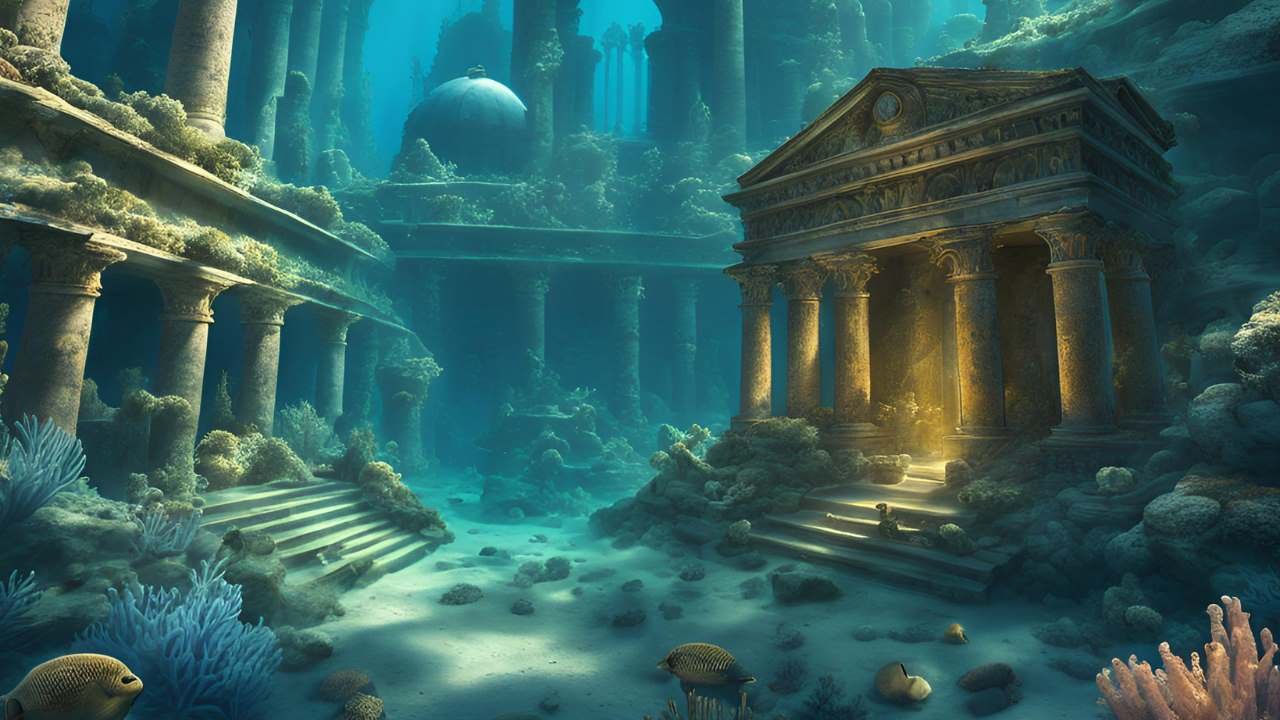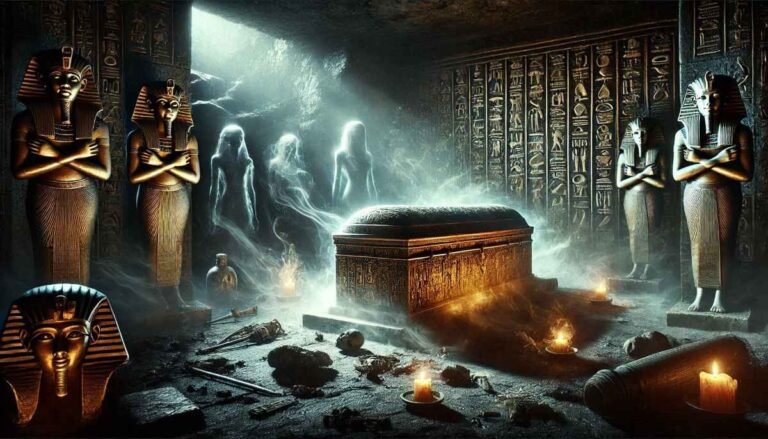
Imagine a civilization so advanced, so spiritually attuned, that it thrived in harmony with nature, wielding powers we can only dream of today. This legendary society, known as Atlantis, is said to have vanished without a trace, leaving behind only tantalizing hints of its existence. Could this lost city hold the keys to secrets long forgotten? Today, we delve into the mystery of Atlantis—exploring its formation, destruction, and the enduring questions surrounding its reality, along with what we can learn from its legacy.
Table Of Contents
- The Formation of Atlantis
- The Fall of Atlantis: Theories of Destruction
- Is Atlantis Real? Exploring the Evidence
- Technological Marvels of Atlantis – Fact or Fiction?
- The Influence of Atlantis on Culture and Literature
- Could We Find Atlantis Today?
- The Legacy of Atlantis: Lessons for Modern Civilization
- Atlantis in Modern Spirituality and Philosophy
- Final Thoughts: What Can We Learn from Atlantis?
The Formation of Atlantis
According to Plato, the tale of Atlantis begins around 9,000 years before his time. He described it as a powerful island nation situated beyond the Pillars of Hercules, which we now recognize as the Strait of Gibraltar. Atlantis was said to be a marvel of engineering and urban planning, featuring grand palaces, lush gardens, and advanced technologies that harmonized with the environment.
Geological and Historical Parallels
Geologists have long studied areas such as the Mediterranean and Caribbean for clues about sunken lands. One intriguing theory links Atlantis to the island of Santorini, which experienced a massive volcanic eruption around 1600 BCE. This catastrophic event led to the collapse of the Minoan civilization and shares eerie similarities with the Atlantis myth.
Some theorists suggest that Atlantis might have been part of a larger landmass, now submerged, potentially linked to a world we may never fully understand.
If you’re fascinated by the mystery of Atlantis, don’t miss our YouTube video, “Atlantis Uncovered.” Dive into the legend, explore ancient theories, and uncover the secrets of this legendary lost civilization. Watch it here and journey into the depths of history!
The Fall of Atlantis: Theories of Destruction
Plato’s account of Atlantis’ downfall is as dramatic as its rise. He claimed that the island sank into the ocean in a single day and night, punished by the gods for the arrogance and moral decay of its people.
Scientists and historians have proposed various theories about how such a disaster could have occurred:
Volcanic Eruptions
One of the most compelling theories links the story of Atlantis to catastrophic volcanic eruptions. The eruption of the Santorini (Thera) volcano around 1600 BCE is often cited as a possible inspiration for Plato’s account. This eruption was one of the largest in recorded history, causing massive devastation to the nearby Minoan civilization on Crete. The eruption produced a colossal ash cloud, destroyed settlements, and triggered a series of tsunamis.
The resulting environmental and social upheaval could have been remembered as a divine punishment, as Plato described. The suddenness and magnitude of the eruption align with the idea of Atlantis sinking “in a single day and night.”
Tsunamis
Tsunamis are another plausible cause for the sudden destruction of a civilization like Atlantis. Large-scale tsunamis, often triggered by undersea earthquakes or volcanic eruptions, can devastate coastal regions. The Indian Ocean tsunami of 2004 and the Tōhoku tsunami in Japan in 2011 are modern examples of the sheer power and destructive potential of these natural disasters.
In ancient times, such an event could have easily wiped out an island civilization, particularly if it lacked the means to anticipate or mitigate the impact. Plato’s description of Atlantis disappearing into the sea could reflect collective memories of a tsunami’s aftermath, where land and people were seemingly swallowed by the ocean.
Climate Change
Gradual but catastrophic climate changes might have also played a role in the loss of Atlantis. Sudden shifts in climate could lead to rising sea levels, flooding low-lying areas, and altering the environment dramatically. For instance, the end of the last Ice Age around 10,000 years ago saw significant sea level rises, inundating large tracts of land that were once habitable.
These changes might not have been as immediate as a volcanic eruption or tsunami but could have had long-lasting effects on civilizations. The narrative of Atlantis could be a distant echo of such gradual environmental changes that ultimately led to the disappearance of fertile lands and thriving communities.
Comet Impact
Some researchers have proposed that a comet or meteorite impact could have caused the catastrophic events described in the Atlantis story. Such impacts can result in immediate and widespread destruction, including massive shockwaves, wildfires, and changes in climate due to the ejection of dust and debris into the atmosphere.
Historical evidence suggests that comet impacts have caused significant disruptions to life on Earth, such as the one that led to the extinction of the dinosaurs 66 million years ago. A smaller but still catastrophic impact could have led to regional destruction and been remembered in myths and legends as the sudden disappearance of a great civilization.
Is Atlantis Real? Exploring the Evidence
The debate over Atlantis’ existence has captivated thinkers for centuries. Skeptics view it as an allegory, a moral lesson embedded in a fictional tale. However, there are those who believe Atlantis was a real place, pointing to submerged structures and ancient ruins as potential evidence.
The Bimini Road
One of the most famous pieces of supposed evidence is the Bimini Road in the Bahamas. This underwater rock formation appears to be a man-made road or wall, leading some to believe it’s a remnant of Atlantis. However, mainstream archaeologists argue that it’s a natural formation, resulting from geological processes.
Advanced Ancient Civilizations
Beyond Atlantis, discoveries of other ancient advanced societies, like the Indus Valley or the Olmec civilization, show that human ingenuity and technological sophistication were more widespread than once believed. Could Atlantis have been one such civilization, lost to history but remembered through myth?
Technological Marvels of Atlantis – Fact or Fiction?
One of the most captivating aspects of the Atlantis legend is its supposed technological prowess. Plato described a civilization with advanced engineering, architecture, and even technology that far surpassed anything known in his time.
Advanced Architecture and Urban Planning
Atlantis was said to feature sophisticated urban planning with concentric rings of water and land, connected by canals and bridges. The city was reportedly adorned with grand palaces, temples, and advanced irrigation systems, designed for both functionality and beauty.
Many modern theorists speculate that if Atlantis did exist, its architectural innovations could have included early forms of aqueducts, advanced metallurgy, and even power generation. These ideas challenge the conventional timeline of technological development and suggest that ancient civilizations might have possessed knowledge lost to history.
Energy Crystals and Power Sources
Some more speculative theories propose that Atlanteans used crystals as powerful energy sources. This idea is popular in New Age circles, where it is believed that large crystals could harness and amplify natural energy, providing power for everything from lighting to advanced machinery.
Though this may sound like science fiction, it echoes modern explorations into crystal-based technologies, such as quartz used in watches and potential applications in quantum computing. While there is no scientific evidence to support the existence of Atlantean energy crystals, the concept continues to inspire imagination and innovation.
Influence on Modern Innovations
The idea of lost Atlantean technology has influenced numerous inventors and visionaries. Some claim that early pioneers of electricity, like Nikola Tesla, were inspired by the notion of ancient advanced knowledge. The myth of Atlantis has also fueled countless speculative fiction works that explore themes of forgotten technologies and civilizations.
Even though these ideas remain firmly in the realm of speculation, they highlight humanity’s enduring curiosity and drive to push the boundaries of technological understanding.
The Influence of Atlantis on Culture and Literature
Atlantis has left an indelible mark on literature, art, and popular culture. From Plato’s dialogues to modern films, the idea of a lost, advanced civilization continues to fascinate.
Movies like “Atlantis: The Lost Empire” and shows like “Stargate Atlantis” have brought the legend to new generations. These stories often depict Atlantis as a utopia with advanced technology, posing questions about what humanity might achieve if we lived in harmony with nature and each other.
Could We Find Atlantis Today?
Modern technology has fueled new searches for Atlantis. From satellite imaging to deep-sea explorations, researchers continue to scan the ocean floor in hopes of uncovering lost cities.
Recent Discoveries
In 2018, researchers found what they believe could be remnants of an ancient civilization off the coast of Spain, sparking renewed interest in the Atlantis theory. These discoveries, while inconclusive, show that our planet still holds many secrets.
The Quest Continues
Advances in technology, such as underwater drones and high-resolution sonar mapping, are pushing the boundaries of exploration. While definitive evidence of Atlantis remains elusive, every new expedition contributes to our understanding of ancient history.
The Legacy of Atlantis: Lessons for Modern Civilization
Atlantis is more than a tale of a lost city; it’s a cautionary story about hubris and the consequences of environmental neglect. The myth challenges us to reflect on our relationship with technology and nature.
In a world facing climate change and environmental crises, the story of Atlantis reminds us of the fragile balance between progress and sustainability. It urges us to build societies that prioritize the well-being of the planet and future generations.
Atlantis in Modern Spirituality and Philosophy
Atlantis has also found a place in spiritual and esoteric traditions. Many believe that Atlanteans possessed advanced knowledge of energy, healing, and consciousness. This wisdom, they argue, can guide humanity toward a more enlightened future.
Philosophical Reflections
Atlantis sparks profound questions: How do we define progress? What lessons can we learn from past civilizations to avoid repeating their mistakes? How can we ensure our advancements benefit all of humanity?
Final Thoughts: What Can We Learn from Atlantis?
The allure of Atlantis lies in its mysteries and the possibilities it represents. Whether you see it as a historical enigma or a symbolic tale, Atlantis challenges us to think about our past, our potential, and our responsibilities to the future.
Thank you for joining us on this fascinating journey into the mysteries of Atlantis! The stories, theories, and legends surrounding this lost civilization continue to spark curiosity and debate across generations. Whether you believe Atlantis was a real place or a symbolic tale, its legacy remains a powerful reminder of humanity’s quest for understanding the unknown.
We’d love to hear your thoughts—do you think Atlantis truly existed, or is it simply one of history’s most captivating legends? Share your perspective in the comments and let the discussion unfold.
As we leave the shores of Atlantis for now, we’ll close with a fitting quote:
“The sea, once it casts its spell, holds one in its net of wonder forever.” – Jacques Cousteau
Until next time, keep exploring, questioning, and diving into the mysteries of the past.








1 thought on “Atlantis Uncovered: Could the Lost City Hold the Secrets to Modern Civilization?”